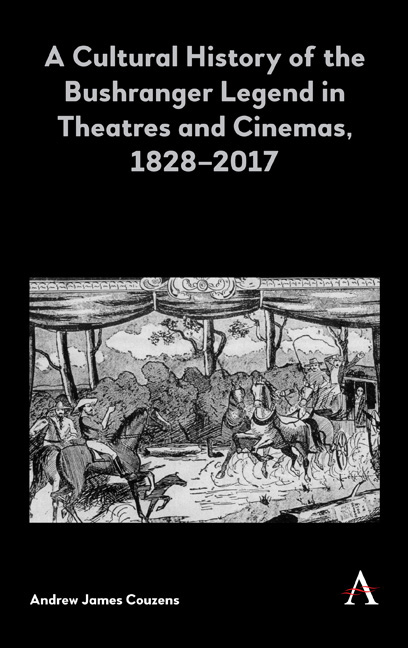Book contents
- Frontmatter
- Contents
- List of Figures
- Acknowledgements
- Introduction: Defining the Bushranger Legend
- Part 1 Establishing the Legend
- 1 The First Bushranger Melodramas
- 2 Alfred Dampier and the Nationalist Melodrama
- 3 Wild West Shows and Wild Australia
- 4 Hippodramas and Edward Irham Cole
- Part 2 Developing the Legend
- Part 3 Fragmenting the Legend
- Conclusion
- Bibliography
- Index
1 - The First Bushranger Melodramas
from Part 1 - Establishing the Legend
Published online by Cambridge University Press: 14 February 2019
- Frontmatter
- Contents
- List of Figures
- Acknowledgements
- Introduction: Defining the Bushranger Legend
- Part 1 Establishing the Legend
- 1 The First Bushranger Melodramas
- 2 Alfred Dampier and the Nationalist Melodrama
- 3 Wild West Shows and Wild Australia
- 4 Hippodramas and Edward Irham Cole
- Part 2 Developing the Legend
- Part 3 Fragmenting the Legend
- Conclusion
- Bibliography
- Index
Summary
When the First Fleet reached Australia's shores in 1788 so too did British stage traditions. The theatrical life of the colony was remarkably vibrant considering its function as a penal settlement. Stage traditions and performances were mostly imported from Europe, but when early nineteenth- century colonials of varying backgrounds began to author original local dramas, bushrangers were the first subjects. Three of the earliest melodramas written in Australia exemplify local playwrights’ interest in bushranging as an expression of the colony's unique attributes. The three plays adhere to melodramatic conventions established in Europe. However, the details inspired by local experience formed foundations for stage and screen depictions of the bushranger legend.
The first of the three plays composed was David Burn's The Bushrangers, which became the first Australian play ever performed when it was staged in 1829 at the Caledonian Theatre in Edinburgh. David Burn was born in Scotland, moving to Australia in 1826 as a free settler. The play was not performed in Australia ‘owing to Burn's critical attitude towards the administration’. Tellingly, Burn included an epilogue for his audience, apologizing for the convict themes and the author's inexperience, implying the lesser status of Australian drama in comparison to the British product. He also draws attention to the lack of certain melodramatic conventions, particularly love, marriage and sentiment. The epilogue may have been humorous and ironic, but it still suggests anxiety over supposedly lesser Antipodean themes. The narrative follows outlaw hero conventions, casting its protagonist in the Robin Hood mould. Convict Matthew Brady escapes from Macquarie Harbour with a gang. While at large, he becomes an embarrassment to the colonial administration, particularly the Governor, who reluctantly offers greater rewards for Brady's capture. Brady assists a family of free settlers before a member of his gang betrays him to the authorities and he is killed in the ensuing gunfight.
The first play written, performed and published in Australia was another titled The Bushrangers, this time in 1834 by newspaper entrepreneur Henry Melville, a wealthy migrant to Hobart. The play was published anonymously in the Hobart Town Magazine, one of Melville's publications. According to the letter to the editor published alongside the play, of which Melville was both recipient and author, he wrote it with the intention of ‘introducing a few Colonial characters’.
- Type
- Chapter
- Information
- Publisher: Anthem PressPrint publication year: 2019

